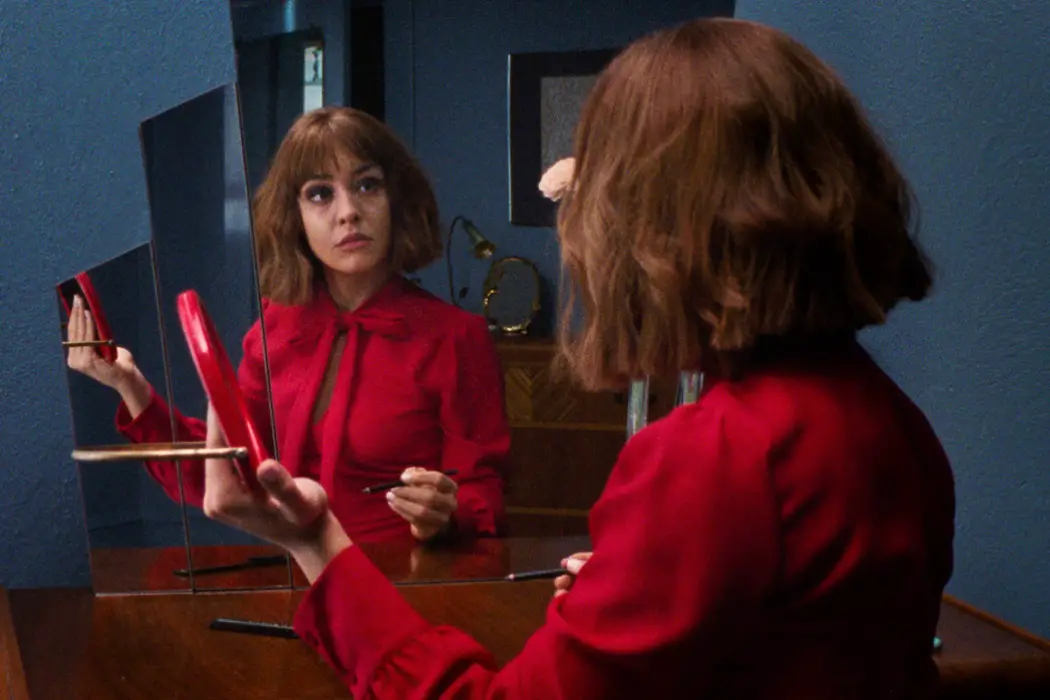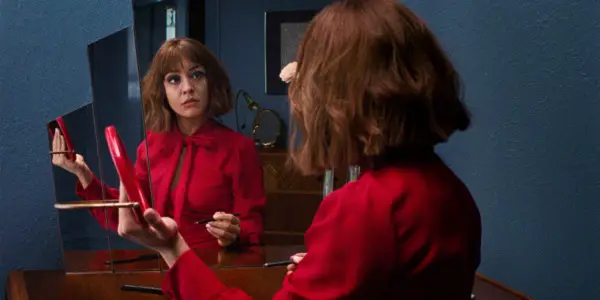SUPERIOR: A Topsy-Turvy Twin Drama

Lee Jutton has directed short films starring a killer toaster,…
Erin Vassilopoulos’ short film Superior, starring Alessandra and Ani Mesa as twin sisters in a small town whose seemingly indestructible bond snaps with the arrival of a mysterious stranger, premiered at Sundance in 2015. The short is a hallucinatory slice of coming-of-age drama, shot on 16mm film with a distinctive vintage color palette, that tonally and visually reminds one of everything from Yorgos Lanthimos’ Dogtooth to David Lynch’s Twin Peaks.
Six years later, Vassilopoulos returned to the weird world of Superior for her first feature-length film, accompanied once again by the Mesa twins and cinematographer Mia Cioffi Henry. Yet while filmmakers often end up expanding old shorts for their first features, this Superior is actually a sequel to the original. Picking up six years after the short left off, it chronicles the reconciliation of the twins after a long separation and the blurring of their identities that results.
Double Trouble
When we are first introduced to Marian (Alessandra Mesa, who also co-wrote the script with Vassilopoulos) she’s desperately fleeing down a highway in the dead of night, the bright red of the jumpsuit she’s wearing a perfect match for the red blood dripping down her forehead. Meanwhile, her twin sister, Vivian (Ani Mesa), is calmly cracking eggs into a pan and carrying out other monotonous household tasks. By cutting back and forth between Marian’s adrenaline-fueled escape from her pursuer and Vivian’s eerily quiet domestic life — both visually powerful, albeit in different ways — Superior immediately grabs your attention and shows you that despite appearing almost identical, these two women occupy entirely different worlds.
That’s all about to change. With guitar and amp in tow, Marian arrives at the doorstep of her childhood home in upstate New York, where Vivian lives with her husband, Michael (Jake Hoffman). Marian hasn’t seen or spoken to Vivian in six years, but she’s hoping she can crash with her for a while under the guise of preparing for a recording session with her band; in reality, she’s hiding from Robert (Pico Alexander), the vicious man she just narrowly escaped. Her arrival shakes up Vivian’s life, which has devolved into seemingly endless attempts to conceive a baby that has sucked all of the passion out of her marriage (if there even was any in the first place).

Even as Marian settles into the domestic routine of her sister’s home, she is haunted by her memories of Robert, and the fear that he’s still out there, hunting for her. The frightening hallucinations of him that plague her harken back to the horrifying appearances of Bob in Twin Peaks — yet another way in which Vassilopoulos shows the substantial influence of David Lynch on her storytelling. (There are dashes of Mulholland Drive and Lost Highway to be found here, too, both visually and thematically.)
As the twins reminisce about the past and make up for lost time, their previous bond gradually begins to grow back, and circumstances lead them to start switching places in each other’s lives. In pretending to be Marian, Vivian discovers an exhilarating sense of freedom that she was never able to explore before, but Vivian’s version of Marian is blissfully unaware of the dangers lurking in the shadows of Marian’s life—dangers that are growing closer by the day.
Smoke and Mirrors
One does not have to have seen the original short — in which Marian claims she’s going to run away with the mysterious stranger, only for Vivian to lash out at the idea — in order to appreciate the strange, slightly surreal story of the feature-length Superior. But it does give one a richer understanding of the complex relationship at the center of the film, in which Marian has always been the one who rebelled, the one who ran off in search of something more, while Vivian was content to remain behind in the seemingly safe cocoon of their hometown; as the twins start to switch places, Vivian is able to better appreciate why Marian wanted to leave and did.

The short also provides a nice preview of the rich visual landscape of the feature, which takes place in the year 1987. (While the short doesn’t specify when it takes place, it could easily have been 1981 due to the timeless nature of the sets and costumes.) At its core, the film is a visual medium, and more care has been taken with the contents of each frame in Superior than in many films with much larger budgets.
I grew up in upstate New York myself, and am all too familiar with the strange, land-that-time-forgot quality of some of those small towns, and the way that every establishment — from dive bars to ice cream parlors—looks as though it could have been carved out of someone’s basement. Superior, for all its strange, almost otherworldly flourishes, is grounded in this reality, which feels all the more tangible for having been shot on film; Mia Cioffi Henry’s cinematography adds to the vintage flair in the best way possible, making every single color pop.
Indeed, Superior uses color to great effect in portraying the differences between the twins as well as their gradual blending of personalities. When we first meet Marian, she’s wearing a red jumpsuit; when we next see her, she’s clad in black, while Vivian prefers lighter neutrals of beige and gray. Yet as the sisters start pretending to be each other, both seem to gravitate towards one particular color in the other’s wardrobe: bright red. The resurgence of the color, which grows more prominent as the film progresses, serves as a big flashing warning sign to the audience that things are getting more and more dangerous; it’s obvious, to be sure, but it is effective. As Superior approaches its climax, the two girls—now sporting the same hairstyle and similar red outfits — are almost impossible to tell apart, which is when things start to get really messy.
Wonderful and Strange
The film’s soundtrack is a perfect match for its visuals, a mix of original music by Jessica Moss and 1980s deep cuts that accentuate the retro setting without having the distracting quality that can come with using more well-known needle drops. Rich with droning synths and haunting vocals, the music meshes with the film’s sound design to create an appropriately haunting atmosphere, especially in the moments surrounding Marian’s hallucinations.

While Superior is a sequel, not an expansion, of a short film, it does suffer from the same weakness that plagues so many features based on short films: a slow, saggy middle. The film begins and ends powerfully—and violently — but takes far too long to bridge the gap between these phenomenal sequences. As Marian and Vivian tiptoe towards taking on each other’s identities (and who doesn’t love an iconic twin-switch plot twist?) one wishes that they would pick up the pace; perhaps then we’d be spared some of the scenes featuring Vivian’s bland, boring husband, which feel as though they go on indefinitely. Then again, those do make it all too easy to understand why Vivian would want to pretend to be Marian in order to escape her current life.
That being said, Alessandra and Ani Mesa keep you invested in these characters through the film’s more mundane moments. By casting real twins, instead of using special effects magic to allow one actor to double, the audience gets a better, fuller sense of how unique the twin relationship is, and witnesses to chemistry that cannot be replicated. I’d love for them to revisit Marian and Vivian again down the road — perhaps after another six-year gap — to see what would happen next.
Conclusion
Superior is not without its flaws, and it wears its influences on its sleeve almost to a fault, but it’s still a worthwhile watch.
What do you think? Do you have any favorite films about twins or doppelgangers? Share your thoughts in the comments below.
Superior begins a one-week exclusive New York run at BAM Rose Cinemas on March 25, 2022. You can find additional release dates here.
Does content like this matter to you?
Become a Member and support film journalism. Unlock access to all of Film Inquiry`s great articles. Join a community of like-minded readers who are passionate about cinema - get access to our private members Network, give back to independent filmmakers, and more.
Lee Jutton has directed short films starring a killer toaster, a killer Christmas tree, and a not-killer leopard. Her writing has appeared in publications such as Film School Rejects, Bitch: A Feminist Response to Pop Culture, Bitch Flicks, TV Fanatic, and Just Press Play. When not watching, making, or writing about films, she can usually be found on Twitter obsessing over soccer, BTS, and her cat.













